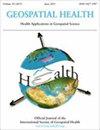Habitat suitability map of Ixodes ricinus tick in France using multi-criteria analysis.
IF 0.9
4区 医学
Q4 HEALTH CARE SCIENCES & SERVICES
引用次数: 1
Abstract
The tick Ixodes ricinus is widely distributed across Europe and is responsible for the transmission of several pathogens to humans and animals. In this study, we used a knowledge-based method to map variations in habitat suitability for I. ricinus ticks throughout continental France and Corsica. The multi-criteria decision analysis (MCDA) integrated four major biotic and abiotic factors known to influence tick populations: climate, land cover, altitude and the density of wild ungulates. For each factor, habitat suitability index (HSI) values were attributed to different locations based on knowledge regarding its impact on tick populations. For the MCDA, two methods of factor combination were tested, additive and multiplicative, both which were evaluated at the spatial scales of departments and local municipalities. The resulting habitat suitability maps (resolution=100x100 m) revealed that conditions are suitable for I. ricinus over most of France and Corsica. Particularly suitable habitats were located in central, north-eastern and south-western France, while less-suitable habitats were found in the Mediterranean and mountainous regions. To validate the approach, the HSI scores were compared to field data of I. ricinus nymph abundance. Regardless of scale, the correlation between abundance indicator and HSI score was stronger for the additive than for the multiplicative approach. Overall, this study demonstrates the value of MCDA for estimating habitat suitability maps for I. ricinus abundance, which could be especially useful in highlighting areas of the tick's distribution where preventive measures should be prioritised.利用多标准分析法绘制法国蓖麻蜱生境适宜性图。
蓖麻蜱广泛分布在欧洲各地,并负责将几种病原体传播给人类和动物。在这项研究中,我们使用了一种基于知识的方法来绘制整个法国大陆和科西嘉岛蓖麻蜱生境适宜性的变化。多标准决策分析(MCDA)综合了已知影响蜱虫种群的四种主要生物和非生物因素:气候、土地覆盖、海拔和野生有蹄动物密度。对于每个因子,生境适宜性指数(HSI)值基于其对蜱虫种群影响的知识归因于不同的位置。对MCDA进行了加性和乘性两种因子组合方法的检验,并在部门和直辖市的空间尺度上进行了评价。绘制的生境适宜性图(分辨率为100 × 100 m)显示,法国和科西嘉岛的大部分地区条件适宜蓖麻蠓生长。特别适合的栖息地位于法国中部、东北部和西南部,而不太适合的栖息地则位于地中海和山区。为了验证该方法,将HSI评分与蓖麻若虫丰度的现场数据进行了比较。无论何种尺度,加性方法的丰度指标与恒生指数评分之间的相关性强于乘法方法。总的来说,这项研究证明了MCDA在估计蓖麻蜱丰富度的栖息地适宜性地图方面的价值,这在突出蜱的分布区域时尤其有用,这些区域应该优先采取预防措施。
本文章由计算机程序翻译,如有差异,请以英文原文为准。
求助全文
约1分钟内获得全文
求助全文
来源期刊

Geospatial Health
医学-公共卫生、环境卫生与职业卫生
CiteScore
2.40
自引率
11.80%
发文量
48
审稿时长
12 months
期刊介绍:
The focus of the journal is on all aspects of the application of geographical information systems, remote sensing, global positioning systems, spatial statistics and other geospatial tools in human and veterinary health. The journal publishes two issues per year.
 求助内容:
求助内容: 应助结果提醒方式:
应助结果提醒方式:


